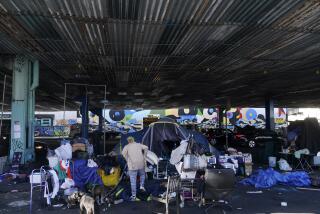Judge Rejects Challenge to City Curfew During Riots : Courts: ACLU sought limits on future emergency powers, calling the law vague. Judge says he will not tie the hands of government.
- Share via
A Los Angeles judge has thrown out a legal challenge to the curfew imposed during last spring’s riots, saying he did not want to tie the hands of city leaders in a future emergency.
Ruling on a lawsuit brought by the American Civil Liberties Union and representatives of the homeless, Superior Court Judge Bruce R. Geernaert said that it was “impossible to predict” what crisis would beset the city next and how authorities might respond.
But he invited the ACLU and other critics to challenge any new curfew as soon as it is imposed, if they believe it illegal.
The ACLU had argued that the riot curfew was too vague, that minorities were unfairly subject to arrest--in part because the terms were not published in Spanish--and that it was impossible for homeless people to comply. The group also asked the court to impose guidelines on future use of the city’s emergency curfew power--such as requiring that tent shelters be set up for the homeless.
ACLU attorney Silvia Argueta said Wednesday that the group is considering an appeal of Tuesday’s ruling, but hopes that the dispute can be resolved in negotiations with the Los Angeles city attorney’s office.
“We’ve entered into a dialogue on the issues of how notice will be issued in the event of an emergency and how the city will handle the homeless population,” Argueta said. “We would hope the city would realize that . . . they should have a plan how to house these people in an emergency.”
Mayor Tom Bradley announced the dusk-to-dawn curfew April 30 and, as rioting continued, similar measures were imposed in other cities.
Although many homeless people were arrested in sweeps and pleaded guilty to misdemeanors, city prosecutors said they would drop charges against anyone who had no way to get off the streets.
Assistant City Atty. Linda Lefkowitz said Geernaert was right to rule that it was inappropriate to impose restrictions on city officials “for an unknown emergency I know nothing about.”
“The court could not assume an emergency in the near future,” Lefkowitz said, “(and) even if you could assume (one), you wouldn’t know what specifically the mayor or the police force would need to do.”
“What he ended up saying (was) if there’s another emergency and some regulation is promulgated that you feel is unconstitutional, what you should do right on the spot is telephone the court and we’ll be there for you.”
Also, the Los Angeles public defenders office filed constitutional challenges to the curfew law, appealing a series of criminal cases in which individuals were convicted. Those failed.
Public defenders argued that it should not have been a crime merely to be on the streets after dark, but that there should be a showing that the person had an intent to commit a crime.
The ACLU action, in contrast, maintained that the emergency order was unclear because Bradley gave the impression that compliance was voluntary by saying police would not be “trying to arrest everybody in town, not trying to prevent them from carrying out their normal lives.”
A spokesman for the mayor, however, said the message was clear: “Stay off the streets.”
More than 3,000 people were arrested for curfew violations.
More to Read
Sign up for Essential California
The most important California stories and recommendations in your inbox every morning.
You may occasionally receive promotional content from the Los Angeles Times.













